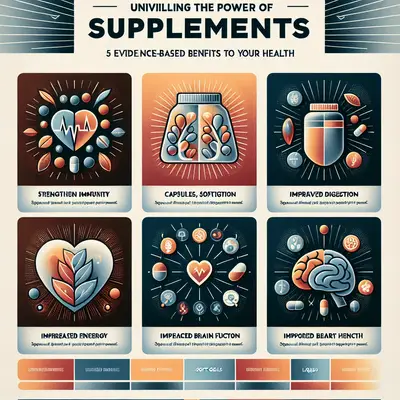Spirulina
Spirulina, a blue-green algae, is dense in vitamins, minerals, and proteins. It's also a rich source of phycocyanin, a potent antioxidant with anti-inflammatory properties[^1^]. Spirulina is known to enhance immune function, lower cholesterol, and even aid in weight loss[^2^].
Turmeric
This golden spice is more than just a kitchen staple. Turmeric contains curcumin, a phytonutrient known for its potent anti-inflammatory and antioxidant effects[^3^]. Including a turmeric supplement in your regimen can help manage chronic inflammation, support brain health, and protect against heart disease[^4^].
Green Tea Extract
Green tea is abundant in catechins, phytonutrients with potent antioxidant and anti-inflammatory properties[^5^]. Green tea extract has been linked to increased fat burning, improved brain function, and reduced risk of heart disease[^6^].
Resveratrol
Found in the skin of grapes and berries, resveratrol is a polyphenol with powerful antioxidant properties. Research suggests that it may help protect the heart and brain, slow aging, and even combat cancer[^7^].
Ginger
A common ingredient in many kitchens, ginger is rich in gingerols, phytonutrients with potent anti-inflammatory and antioxidant benefits[^8^]. Supplementing with ginger may aid digestion, reduce nausea, and alleviate muscle pain[^9^].
Conclusion
Phytonutrient-rich supplements offer a natural pathway to enhancing health and wellbeing. Incorporating these into your daily regimen can provide a variety of benefits, from combating inflammation to protecting against age-related diseases. As always, consult with a healthcare provider before starting any new supplement regimen.
^1^]: [Spirulina in Clinical Practice: Evidence-Based Human Applications
^2^]: [A Review on Culture, Production and Use of Spirulina as Food for Humans and Feeds for Domestic Animals
^3^]: [Curcumin: A Review of Its' Effects on Human Health
^4^]: [Turmeric and Curcumin: Biological Actions and Medicinal Applications
^5^]: [Green Tea Catechins: Their Use in Treating and Preventing Infectious Diseases
^6^]: [The Effects of Green Tea on Weight Loss and Weight Maintenance: a Meta-Analysis
^7^]: [The Impact of Dietary Polyphenols on COX-2 Expression in Colorectal Cancer
^8^]: [Anti-Oxidative and Anti-Inflammatory Effects of Ginger in Health and Physical Activity: Review of Current Evidence
^9^]: [Ginger—An Herbal Medicinal Product with Broad Anti-Inflammatory Actions



